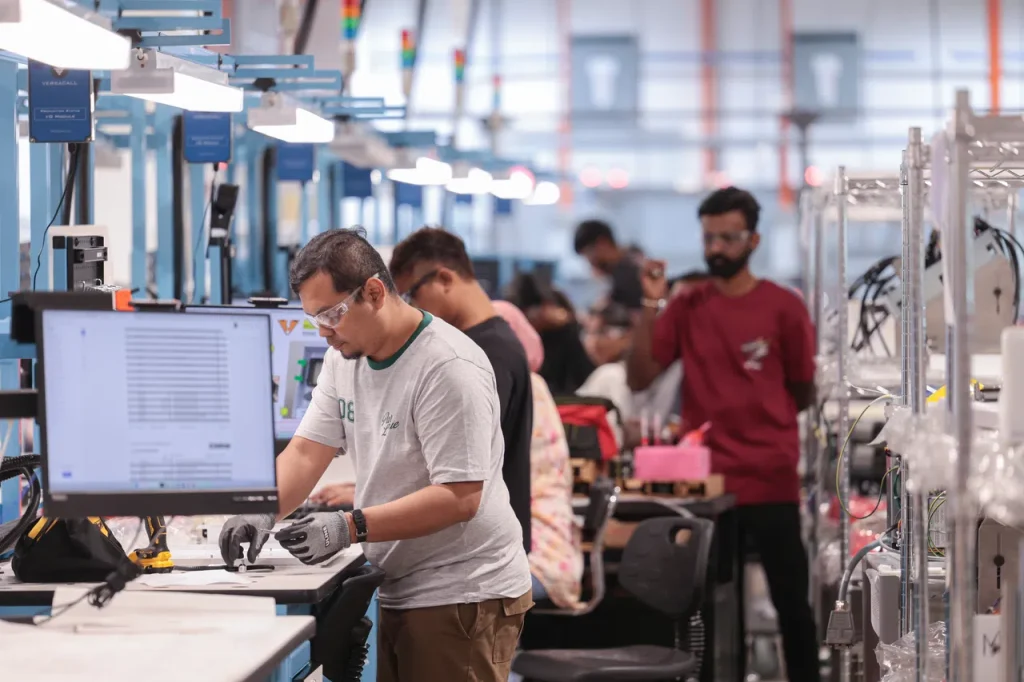[SINGAPORE] Singapore’s overall factory activity fell sharply last month, retreating into contraction territory and mirroring the regional pullback, as US President Donald Trump’s “Liberation Day” tariffs began to exact a toll on manufacturers.
The city-state’s Purchasing Managers’ Index (PMI) dropped to 49.6, shaving off one point from the previous month and ending a 19-month streak of expansion, data from the Singapore Institute of Purchasing and Materials Management (SIPMM) showed on Friday (May 2). A reading above 50 indicates expansion.
The electronics sector PMI, which was on a 17-month streak of expansion, also recorded a steep fall to 49.8 in the same period, down 1.1 points from March.
These readings coincide with Trump’s onslaught of tariffs announced on Apr 2, even if they are on pause for most countries other than China.
DBS economist Chua Han Teng said that the fall in the readings was the steepest observed since the Covid-19 pandemic in early 2020.
“A more protectionist global landscape – led by higher US tariffs on a wide range of trading partners including China – will likely further dampen external demand, negatively impacting Singapore’s manufacturing prospects, especially in the second half of 2025,” he noted.
BT in your inbox

Start and end each day with the latest news stories and analyses delivered straight to your inbox.
He added that Singapore’s electronics and biomedical manufacturing clusters remain “susceptible” to potential US levies on semiconductor and pharmaceutical imports that could be introduced later on.
“Singapore’s deep integration into the global semiconductor supply chain makes it indirectly vulnerable to a broader US tariff-induced semiconductor downturn. US pharmaceutical import duties pose higher downside growth risks for Singapore compared to other Asean-6 peers,” he explained.
Regional retreat
Elsewhere, China’s official PMI fell to 49 in April, from 50.5 in March, representing the fastest fall in 16 months.
The Caixin PMI, derived from smaller private manufacturers, came in at 50.4, down 0.8 point from before. While this is the lowest recording since January, April marks the seventh straight month of expansion.
“The US tariff hikes took a toll on external demand, with new export orders declining at the fastest rate since July 2023, leading to just a marginal increase in total new orders in April,” said Wang Zhe, senior economist at Caixin Insight Group.
Despite the early negative impact from the tariffs, however, Citi economists Yu Xiangrong, Hu Yuanliu and Ji Xinyu said in a report that “the path for de-escalation could be relatively narrow and domestic support would likely step up ahead”.
They added that the “hard trade data” may hold up better, based on their tracking of port and shipping.
In South Korea, the S&P Global Manufacturing PMI sank deeper in April to 47.5, from 49.1 the previous month. This is the most pronounced worsening of business conditions since September 2022.
“According to manufacturers, challenging domestic economic conditions and the impact of US tariffs weighed heavily on the sector, stymieing new product launches and sales in both domestic and external markets,” said Usamah Bhatti, economist at S&P Global Market Intelligence.
Similarly, Taiwan’s PMI, also published by S&P Global, dived to 47.8 in April, down two points from the month before and the quickest rate of decline since December 2023.
Annabel Fiddes, economics associate director at S&P Global Market Intelligence, said that manufacturers reacted to the weaker demand environment “by curbing their input buying, downwardly adjusting their stock levels and cutting their selling prices”.
Countries across South-east Asia also saw their PMI receding into contraction. In particular, the S&P Global Indonesia Manufacturing PMI plunged to 46.7 in April, from 52.4 in the previous month – the most marked deterioration in business conditions since August 2021.
“In response, firms engaged in retrenchment practices by scaling back purchasing and employment levels while also winding down stocks of inputs and finished items,” said Bhatti. He added: “The near-term outlook remains clouded, as manufacturers redirected capacity to complete outstanding business in the absence of sales, suggesting that the current malaise will extend into the coming months.”
Malaysia and Thailand recorded more marginal decreases – down 0.2 point at 48.6 for the former; and 0.4 point lower at 49.5 for the latter.


